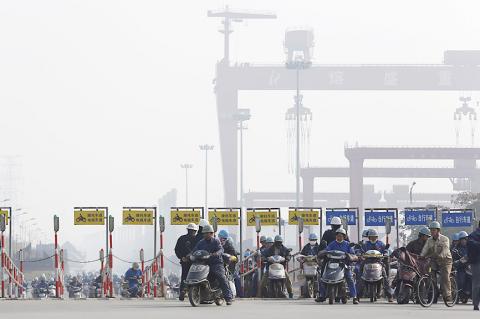China’s exports for last month grew much more strongly than expected, official figures showed yesterday, as a rebound in overseas shipments gained strength on demand from China’s US and Europe.
Exports increased 12.7 percent to US$202.2 billion from November last year, the Chinese General Administration of Customs said — compared with a forecast of 7 percent in a poll of 11 economists by the Wall Street Journal reported by Dow Jones Newswires.
Imports were up 5.3 percent year-on-year to US$168.4 billion, with China’s trade surplus last month expanding to US$33.8 billion from US$31.1 billion in October.

Photo: Reuters
The surplus for last month was also considerably larger than the median forecast of US$21.7 billion by the 11 economists.
The surprisingly strong exports data came after overseas shipments expanded 5.6 percent in October following a decline of 0.3 percent in September.
“China’s November exports came in much higher than expected,” ANZ bank economists Liu Li-Gang (劉利剛) and Zhou Hao (周浩) said in a report, citing “better demand from developed economies” the US and the EU.
The latest trade data came after China’s economy snapped out of a first-half slump, with GDP growth in the third quarter accelerating to 7.8 percent after it slowed during the first two quarters.
Earlier this month, official figures showed that China’s manufacturing growth maintained a strong pace last month from the previous month to stay at a 19-month high.
The purchasing managers’ index (PMI) was at 51.4, unchanged from October, the Chinese National Bureau of Statistics said.
A reading above 50 signals expansion while a figure below indicates contraction.
In the first 11 months of the year, China’s total trade, combining exports and imports, reached US$3.8 trillion, up 7.7 percent from the same period last year, Customs said. The government’s target for this year is 8 percent.
“The data in January to November suggest that China could achieve the 8 percent trade growth target for the whole year,” Liu and Zhou said.
However, they cautioned against overoptimism, stressing what they described as “inflated export growth in the first half of the year” when companies were caught overinvoicing, which instigated a crackdown by Chinese authorities on the practice.
Meanwhile, China, the world’s largest buyer of iron ore, increased imports of the steelmaking ingredient to a record last month as traders replenished stockpiles.
Imports totaled 77.84 million tons last month, up from 67.83 million tonnes in October and 65.78 million tonnes a year earlier, the latest customs data showed.
Cumulative shipments in the first 11 months jumped 10.9 percent to 746.1 million tonnes, the customs agency said.
Iron ore entered a bull market in July as users in China increased stockpiles that shrank in March to the lowest level since 2009.
The market’s supply and demand outlook is positive as producers globally struggle to deliver larger volumes and demand in China continues to grow strongly, Rio Tinto Group iron ore chief executive officer Andrew Harding said on Wednesday.
Additional reporting by Bloomberg

Chizuko Kimura has become the first female sushi chef in the world to win a Michelin star, fulfilling a promise she made to her dying husband to continue his legacy. The 54-year-old Japanese chef regained the Michelin star her late husband, Shunei Kimura, won three years ago for their Sushi Shunei restaurant in Paris. For Shunei Kimura, the star was a dream come true. However, the joy was short-lived. He died from cancer just three months later in June 2022. He was 65. The following year, the restaurant in the heart of Montmartre lost its star rating. Chizuko Kimura insisted that the new star is still down

While China’s leaders use their economic and political might to fight US President Donald Trump’s trade war “to the end,” its army of social media soldiers are embarking on a more humorous campaign online. Trump’s tariff blitz has seen Washington and Beijing impose eye-watering duties on imports from the other, fanning a standoff between the economic superpowers that has sparked global recession fears and sent markets into a tailspin. Trump says his policy is a response to years of being “ripped off” by other countries and aims to bring manufacturing to the US, forcing companies to employ US workers. However, China’s online warriors

Application-specific integrated circuit designer Faraday Technology Corp (智原) yesterday said that although revenue this quarter would decline 30 percent from last quarter, it retained its full-year forecast of revenue growth of 100 percent. The company attributed the quarterly drop to a slowdown in customers’ production of chips using Faraday’s advanced packaging technology. The company is still confident about its revenue growth this year, given its strong “design-win” — or the projects it won to help customers design their chips, Faraday president Steve Wang (王國雍) told an online earnings conference. “The design-win this year is better than we expected. We believe we will win

Intel Corp chief executive officer Lip-Bu Tan (陳立武) is expected to meet with Taiwanese suppliers next month in conjunction with the opening of the Computex Taipei trade show, supply chain sources said on Monday. The visit, the first for Tan to Taiwan since assuming his new post last month, would be aimed at enhancing Intel’s ties with suppliers in Taiwan as he attempts to help turn around the struggling US chipmaker, the sources said. Tan is to hold a banquet to celebrate Intel’s 40-year presence in Taiwan before Computex opens on May 20 and invite dozens of Taiwanese suppliers to exchange views